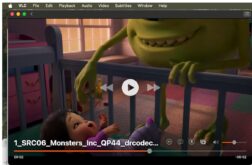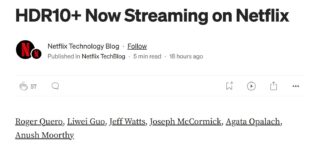HEVC Advance announced today that it is eliminating subscription and title-by-title royalty fees for non-physical HEVC content distribution, making all streaming, cable, over-the-air broadcasts, and satellite distributions of encoded HEVC content royalty free. HEVC encoded content sold on Blu-ray discs and other storage devices will continue to be subject to a royalty. In a related move, HEVC Advance also reduced hardware royalty rates on some lower cost products.
According to HEVC Advance CEO Pete Moller, “From the beginning, we’ve listened to the market and worked to find a balance between what the patent owners want and what licensees need. Though we’re not sure that content royalties are an obstacle, they clearly have taken on a life of their own in the mind of the market, so we’re eliminating them.”
Regarding the lower royalties on devices, HEVC Advance added four additional reduced royalty rates for items sold for less than $80. These are shown on the right in the table below. Here, according to Moller, the goal was to bring the royalty down to about 1% of the net sales price of the unit, again trying to meet the needs of manufacturers of lower-cost devices like security cameras. He clarified that the royalty is on the net sales price of the unit, not retail.
So What Does It Mean?
After Apple added HEVC to HLS, many encoding companies and pundits predicted fast adoption of HEVC by the SVOD and AVOD communities. This doesn’t appear to have happened. One theory I heard while attending Streaming Tech Stockholm late last year was that the content royalties were a significant factor in many smaller European providers not adopting HEVC. If true, HEVC Advance’s announcement may be a big step forward.
Of course, HEVC Advance isn’t the only pool in town. Though MPEG LA doesn’t charge for HEVC-encoded content, the Velos pool, which represents Ericsson, Panasonic, Qualcomm, Sharp, and Sony, hasn’t ruled this out. We asked a representative from Velos about content royalties, and she recited what’s on the Velos FAQ almost verbatim: “As it relates to content, we are continuing to assess the market to fully understand the dynamics of the ecosystem and ensure that our model best supports the advancement and adoption of HEVC technology.” Interestingly, the rep indicated that Velos has established a pricing model, but that they “don’t plan to publish our royalty rates at this point.” This is the first indication that we’ve had that royalty rates are actually available, a fact surprisingly not worthy of a press release on the Velos website.
While HEVC Advance eliminating content royalties for HEVC-encoded video not distributed on physical media is a big step, clearly the HEVC royalty landscape remains an expensive and confusing issue. I asked HEVC Advance CEO Moller whether he saw this changing, and he replied, “we’re seeing some consolidation as multiple licensees from the MPEG LA pool have also joined our pool. There are legal and other reasons that make it challenging for patent groups to work together, so we’re doing the best we can to make our pool one that all licensors would like to join.”
 Streaming Learning Center Where Streaming Professionals Learn to Excel
Streaming Learning Center Where Streaming Professionals Learn to Excel









